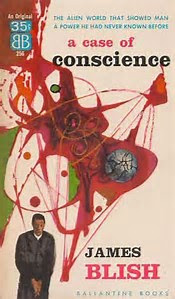People might either not believe in God or have no concept of God in the first place. Jain belief in uncreated, beginningless matter and souls is pre-, not a- or anti-, theist.
In Poul Anderson's Technic History, Ythrians, Merseians and Christians all have different concepts of God whereas Cainites have no such concept. Godless aliens can cause problems for some human beings.
In James Blish's A Case Of Conscience, a Jesuit thinks that the good but Godless Lithians must be a diabolical trick to mislead mankind.
In Harry Harrison's "The Streets of Ashkelon"/"An Alien Agony," the literal-minded Weskers, having learned scientific method from an atheist trader and the story of the Crucifixion and Resurrection from a missionary priest, empirically test the priest's story by crucifying him to see whether he will rise and save them. Thus, they learn guilt.
In Anderson's "The Master Key," when a human being speaks of "God" but does not serve him, the Cainites deduce that human beings are domesticated animals that have gone wild and therefore should be killed.
Thus, these are three thought experiments about misunderstanding and conflict.
A Case Of Conscience is part of Blish's Haertel Scholium and Volume III of his After Such Knowledge Trilogy.
"The Streets of Ashkelon" is a one-off story that could fit into many futuristic, interstellar scenarios, e.g., it could be adapted for Star Trek, and Paul Cook said that it gives credence to the Prime Directive.
"The Master Key" is part of the Nicholas van Rijn series which is part of the Technic History which is one of Poul Anderson's several future history series.

1 comment:
Kaor, Paul!
I've thought of the dominant species of Cain as being not "godless," but natural anarchists who were totally independent and self sufficient once reaching adulthood. And I think that was possible only because the other, domesticated species on Cain had become the transmitters and preservers of knowledge. That was what enabled the dominant species to be as "wild" as we see them. Because they had never been forced by sheer necessity to learn how to cooperate in an "institutional" sense or become subdivided into a multitude of "specializations" of the kind entailed by the principle of the division of labor. Including the necessity of giving orders to larger or smaller groups.
Ad astra! Sean
Post a Comment